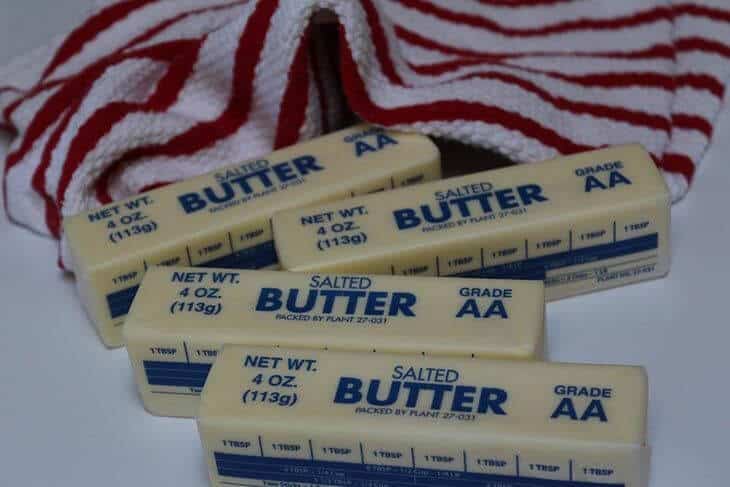Butter is a common ingredient for cakes and pastries, and it goes well with bread, too. In fact, butter has become a staple item in many kitchens because you can use it for quite a number of dishes.
If you’re a fan of butter like I am, you would know that butter tastes best when it’s been stored properly in the fridge. But how long does butter last when refrigerated? And how can you tell if your butter has gone bad?
Today you’ll know everything there is to know about butter’s shelf life and what you need to do to keep your butter tasting great. (Get more cooking tips here)
How Long Does Butter Last?

The USDA says that you can keep butter, whether it’s opened or not, in the fridge for up to three months. While this is the ideal shelf life of butter, some brands can actually last up to 6 months, as long as they are stored properly.
“How Long Does Butter Last?” by EatbyDate.com reports that unopened regular butter can last for at most 1 month past its Best Before date, while opened butter can keep for 2 weeks at the most. Butter with oil fares a bit better: An unopened pack can last for 2 months, while an opened one can keep for up to 3 weeks.
If you wish to keep your butter longer, you may want to freeze it instead. Frozen butter, whether opened or unopened, can last for 6 to 9 months. Of course, the quality of the butter will go down after a while because of the oxidation process, but it will still be good enough to use as an ingredient for your recipe.
How to Test If Your Butter is Still Good or Not

Of course, the easiest way to check for butter spoilage is by looking at its expiry date. But what if the date stamp is no longer readable? Or what if you’ve already transferred the butter into another container? How do you check if it is still good or not?
The best way to know if your butter is still edible is by looking for signs of spoilage. Here are some of the things you can check:
1. Molds and discolorations
A fresh bar of butter is usually light yellow in color, although some varieties may be deep yellow or even white. Spoiled butter may have mold spots in some places, or may appear paler inside that outside.
2. Rancid smell
When the oils in the butter turn rancid, the butter can give off a sour or cheesy scent. This is because the oxidation process produces chemicals that give off an unpleasant decomposing smell. Good butter should have little to no smell, so throw out your butter if it starts smelling funky.
3. Sour taste
Don’t worry about taking a small bite of butter to check for spoilage. Good butter will be a bit oily and creamy, while spoiled butter will taste sour or stale.
4. Texture
Good butter should be easy to melt and mix with other ingredients, as long as it’s been allowed to sit at room temperature for a couple of minutes. Bad butter may be difficult to spread on bread or other dishes. It may also feel either coarse and tough or extra soft and runny.
How to Extend Your Butter’s Shelf Life

Storing butter properly is the best way to fight the onset of early oxidation, which in turn will cause your butter to go bad. Here are some tried and tested tips to extend your butter’s shelf life for months:
Store your butter at a temperature of 40°F or below.
Wrap your butter in plastic wrap or place it in an air-tight container and stick it in the fridge right after purchase. Make sure your refrigerator maintains a temperature of 40°F or lower.
Avoid placing your butter by the fridge’s door.
While there’s a butter compartment at the door of the refrigerator, you should avoid placing your butter there unless you plan to consume it within a week’s time. The temperature usually fluctuates in that area because the door keeps closing and opening.
Freeze your butter into smaller pieces.
If you intend to keep your butter longer, then it’s best if you freeze it outright. Slice your butter into smaller pieces, and wrap each piece in a plastic freeze-wrap or aluminum foil. Frozen butter will keep well for up to 9 months, though its quality will not be as good as the fresh kind.
Extra Tip: How to Soften Butter
So you need butter for some French toast or as an ingredient for cupcakes, but you forgot to take it out the fridge in advance. Weelicious shares four easy ways to soften your butter, which you can do in five minutes or less:
Option 1: Place your butter in between two sheets of parchment paper and run a rolling pin over it. This should soften your butter after a few quick rolls.
Option 2: Cut your bar of butter into smaller pieces. This will help the butter melt faster.
Option 3: Place your butter into a Ziploc bag and soak in a bowl of warm water for a couple of minutes. To test if your butter is soft enough, simply squeeze the bar between your thumb and index finger. If your fingers make a dent on your butter, then it should be soft enough for baking purposes.
Option 4: For the extremely lazy, just stick the butter in your pocket. I don’t really recommend this though, unless you want to end up with sticky fingers and a greasy pocket.
Conclusion
Remember: You need to keep your butter refrigerated if you want it to last for 1 to 3 months. If you wish to keep it longer, it’s best if you freeze it instead.
But don’t just toss the butter into the fridge. Make sure you wrap it in a durable plastic wrap or aluminum foil first or store it in an air-tight plastic container.
Did this article help? Let me know your thoughts in the comments’ section. And please take the time to share this article with your friends. Now go store that butter!
Helpful Links
How Long Does Butter Last? (EatbyDate.com)
Cooking Tips: How to Soften Butter Quickly (Weelicious.com)
Food Storage: How Long Can You Keep Butter—Unopened or Opened Package (StillTasty.com)



























